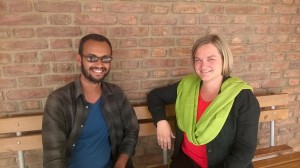
Hanna with Mr. Khalid Idriss, Dean at the College of education.
Hanna Posti-Ahokas is working as an education specialist for the Finn Church Aid. As part of FCA Eritrea education programme, Hanna was sent to the Eritrean Institute of Technology, College of Education to work as an assistant professor focusing on staff development, pedagogical training and research supervision.
Hanna has over 15 years of professional experience from various education and development contexts. She has taught at primary and vocational schools as well as at university in Finland. Before Finn Church Aid, she worked for two UN organizations, the WFP and UNESCO.
Five years after finalizing her Master’s Degree in education, she returned to the academia for doctoral studies. During her university years, Hanna participated in various international research projects and North-South collaboration. She did her doctoral research on girl’s secondary education in Tanzania.
Hanna’s Master’s degree was a combination of home economics, education and development studies. From that time, she started focusing on of education and development issues. “Education is always contextual and linked to people’s real lives and futures”, she explains.
After working as a teacher, education specialist and project coordinator she wanted to return to the academia to further develop her understanding and expertise on education and development. With her Doctoral degree, she now feels equipped for various kinds of work.
Hanna is inspired by the energy and the willingness to develop in many African societies. “I love working in a positive environment where people treat each other well.” However, sometimes the expectations for bringing in Northern expertise is hard to fill as the contexts are so different: “Often I feel that I am coming from another planet”, she laughs. Hanna calls for more relativist approach when working in an international context. “Dealing with ambiguity and diverse perspectives is not easy for anyone.”
During her international assignments, Hanna has started to see how culture is framing our being – it is about collectively learned things that have often become visible and self-evident. Stepping outside your own immediate cultures make your own cultural biases visible. Every incident where a cultural stereotype is broken gives an opportunity to see people more clearly: “I try not to explain things by culture as it often leads to stereotyping”, she explains.
What comes to intercultural competence, Hanna emphasizes how experiencing and recognizing the intercultural is the key. “My strongest learning experiences have occurred in situations where I represent the minority.”
However, you don’t have to travel far for these experiences. “We sent university students around in Helsinki and asked them to go an experience something new”, she explains one of her research projects. “Small things, like talking to a stranger in a bus, provided meaningful experiences and helped to reflect on one’s own approach to diversities.”
For students thinking about an international career, Hanna gives an advice: “Do what you really want to do. Instead of being drawn by titles, destinations, good salary or such, try to look for opportunities that can take you forward professionally.”
Working with global challenges in international environments has made Hanna’s life substantially richer. “You start questioning your values when seeing different contexts where people live good lives. Things are somehow put in proportion and into perspective”, she reflects on her experiences.